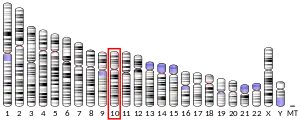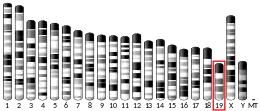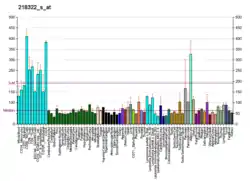ACSL5
Long-chain-fatty-acid—CoA ligase 5 is an enzyme that in humans is encoded by the ACSL5 gene.[5][6]
The protein encoded by this gene is an isozyme of the long-chain fatty-acid-coenzyme A ligase family. Although differing in substrate specificity, subcellular localization, and tissue distribution, all isozymes of this family convert free long-chain fatty acids into fatty acyl-CoA esters, and thereby play a key role in lipid biosynthesis and fatty acid degradation. This isozyme is highly expressed in uterus and spleen, and in trace amounts in normal brain, but has markedly increased levels in malignant gliomas. This gene functions in mediating fatty acid-induced glioma cell growth. Three transcript variants encoding two different isoforms have been found for this gene.[6]
References
- GRCh38: Ensembl release 89: ENSG00000197142 - Ensembl, May 2017
- GRCm38: Ensembl release 89: ENSMUSG00000024981 - Ensembl, May 2017
- "Human PubMed Reference:". National Center for Biotechnology Information, U.S. National Library of Medicine.
- "Mouse PubMed Reference:". National Center for Biotechnology Information, U.S. National Library of Medicine.
- Yamashita Y, Kumabe T, Cho YY, Watanabe M, Kawagishi J, Yoshimoto T, Fujino T, Kang MJ, Yamamoto TT (Dec 2000). "Fatty acid induced glioma cell growth is mediated by the acyl-CoA synthetase 5 gene located on chromosome 10q25.1-q25.2, a region frequently deleted in malignant gliomas". Oncogene. 19 (51): 5919–25. doi:10.1038/sj.onc.1203981. PMID 11127823.
- "Entrez Gene: ACSL5 acyl-CoA synthetase long-chain family member 5".
External links
- Human ACSL5 genome location and ACSL5 gene details page in the UCSC Genome Browser.
Further reading
- Maruyama K, Sugano S (1994). "Oligo-capping: a simple method to replace the cap structure of eukaryotic mRNAs with oligoribonucleotides". Gene. 138 (1–2): 171–4. doi:10.1016/0378-1119(94)90802-8. PMID 8125298.
- Suzuki Y, Yoshitomo-Nakagawa K, Maruyama K, et al. (1997). "Construction and characterization of a full length-enriched and a 5'-end-enriched cDNA library". Gene. 200 (1–2): 149–56. doi:10.1016/S0378-1119(97)00411-3. PMID 9373149.
- Lewin TM, Kim JH, Granger DA, et al. (2001). "Acyl-CoA synthetase isoforms 1, 4, and 5 are present in different subcellular membranes in rat liver and can be inhibited independently". J. Biol. Chem. 276 (27): 24674–9. doi:10.1074/jbc.M102036200. PMID 11319232.
- Minekura H, Kang MJ, Inagaki Y, et al. (2002). "Genomic organization and transcription units of the human acyl-CoA synthetase 3 gene". Gene. 278 (1–2): 185–92. doi:10.1016/S0378-1119(01)00714-4. PMID 11707336.
- Lewin TM, Van Horn CG, Krisans SK, Coleman RA (2002). "Rat liver acyl-CoA synthetase 4 is a peripheral-membrane protein located in two distinct subcellular organelles, peroxisomes, and mitochondrial-associated membrane". Arch. Biochem. Biophys. 404 (2): 263–70. doi:10.1016/S0003-9861(02)00247-3. PMID 12147264.
- Strausberg RL, Feingold EA, Grouse LH, et al. (2003). "Generation and initial analysis of more than 15,000 full-length human and mouse cDNA sequences". Proc. Natl. Acad. Sci. U.S.A. 99 (26): 16899–903. Bibcode:2002PNAS...9916899M. doi:10.1073/pnas.242603899. PMC 139241. PMID 12477932.
- Clark HF, Gurney AL, Abaya E, et al. (2003). "The secreted protein discovery initiative (SPDI), a large-scale effort to identify novel human secreted and transmembrane proteins: a bioinformatics assessment". Genome Res. 13 (10): 2265–70. doi:10.1101/gr.1293003. PMC 403697. PMID 12975309.
- Gassler N, Schneider A, Kopitz J, et al. (2003). "Impaired expression of acyl-CoA-synthetase 5 in epithelial tumors of the small intestine". Hum. Pathol. 34 (10): 1048–52. doi:10.1053/S0046-8177(03)00431-3. PMID 14608540.
- Deloukas P, Earthrowl ME, Grafham DV, et al. (2004). "The DNA sequence and comparative analysis of human chromosome 10". Nature. 429 (6990): 375–81. Bibcode:2004Natur.429..375D. doi:10.1038/nature02462. PMID 15164054.
- Mashek DG, Bornfeldt KE, Coleman RA, et al. (2005). "Revised nomenclature for the mammalian long-chain acyl-CoA synthetase gene family". J. Lipid Res. 45 (10): 1958–61. doi:10.1194/jlr.E400002-JLR200. PMID 15292367.
- Gerhard DS, Wagner L, Feingold EA, et al. (2004). "The status, quality, and expansion of the NIH full-length cDNA project: the Mammalian Gene Collection (MGC)". Genome Res. 14 (10B): 2121–7. doi:10.1101/gr.2596504. PMC 528928. PMID 15489334.
- Gassler N, Obermüller N, Keith M, et al. (2005). "Characterization of metaplastic and heterotopic epithelia in the human gastrointestinal tract by the expression pattern of acyl-CoA synthetase 5". Histol. Histopathol. 20 (2): 409–14. PMID 15736044.
- Obermüller N, Keith M, Kopitz J, et al. (2006). "Coeliac disease is associated with impaired expression of acyl-CoA-synthetase 5". International Journal of Colorectal Disease. 21 (2): 130–4. doi:10.1007/s00384-004-0738-6. PMID 15809837. S2CID 24263574.
- Achouri Y, Hegarty BD, Allanic D, et al. (2006). "Long chain fatty acyl-CoA synthetase 5 expression is induced by insulin and glucose: involvement of sterol regulatory element-binding protein-1c". Biochimie. 87 (12): 1149–55. doi:10.1016/j.biochi.2005.04.015. PMID 16198472.
- Adamo KB, Dent R, Langefeld CD, et al. (2007). "Peroxisome proliferator-activated receptor gamma 2 and acyl-CoA synthetase 5 polymorphisms influence diet response". Obesity (Silver Spring, Md.). 15 (5): 1068–75. doi:10.1038/oby.2007.630. PMID 17495181. S2CID 1525140.
- Gassler N, Roth W, Funke B, et al. (2007). "Regulation of enterocyte apoptosis by acyl-CoA synthetase 5 splicing". Gastroenterology. 133 (2): 587–98. doi:10.1053/j.gastro.2007.06.005. PMID 17681178.
- Zhou Y, Abidi P, Kim A, et al. (2007). "Transcriptional activation of hepatic ACSL3 and ACSL5 by oncostatin m reduces hypertriglyceridemia through enhanced beta-oxidation". Arterioscler. Thromb. Vasc. Biol. 27 (10): 2198–205. doi:10.1161/ATVBAHA.107.148429. PMID 17761945.




